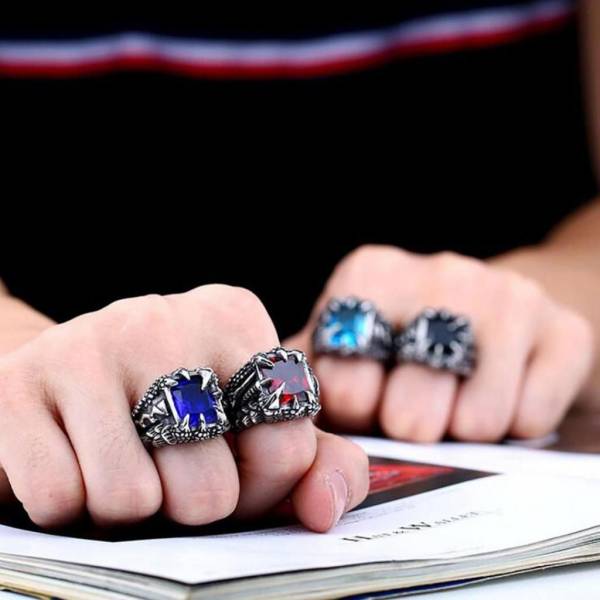Gothic rings take pride of place in jewelry offerings for both men and women. They look diverting and carry a special appeal build on mysticism and romanticism. But what are the things that make us look at these pieces of jewelry with awe? Why don’t we try to figure out the secret of their magnetism?

1. History
Just like many other jewelry styles, Gothic took inspiration from architecture. While Baroque and Rococo jewelry borrowed elegance from French palaces, Gothic baubles looked up to cathedrals and churches. Elongated, with vaulted and rose windows, lavishly decorated and, at the same time, severe, Gothic buildings willingly spread these features onto jewelry.
Despite being fussy and elaborate, Gothic architecture seemed weird for the following generations. They even called it barbaric – not for nothing was this style named after violent Germanic tribes the Goths. This is the paradox of Gothic style – the bells and whistles incorporated into exteriors and interiors didn’t look cute. On the contrary, they looked cold and detached. But over time, people learned to love this majesty. After all, Gothic made a come back a few centuries after its first coming. Neo-Gothic softened strict lines and put emphasis on elegance and femininity.
So, Gothic style was born in the depths of religious architecture, it was considered preposterous and barbaric, but eventually, it turned into the paragon of elegance and sophistication. Quite an interesting journey, don’t you think?
2. Mysticism
At first, Gothic jewelry was steeped in religious mysticism. Indeed, religious parables and the Bible itself never give direct answers, it is always shrouded in an aura of mystery. And if you add up symbolic imagery that can be found in abundance in Catholic temples, then you’ll get a fairly complex phenomenon called the Gothic style. Every flower, twig, and squiggle in Gothic is not an ode to the creativity of nature; it is a reference to religious concepts, many of which are incomprehensible to a person in the street. But isn't it wonderful that so many wondrous discoveries lie in wait for you when you’re unraveling the secrets of seemingly simple symbols?
The second layer of mysticism was added to Gothic in the 20th century when the Goth subculture came on the scene. It enriched Gothic jewelry with so many symbols that weren’t originally there. Surprisingly, jewelry boasting a predominantly religious symbolism did a 180 turn toward paganism and occultism. Christian symbols began to coexist with images from other cultures and religions (for example, crosses juxtapose the Eye of Ra), and what is even more surprising, the divine got mixed with the demonic. The unification of the opposites - isn't it the main mystery of Gothic? If you’d like to see some of these symbols incorporated into jewelry, take a look at this bold collection https://www.bikerringshop.com/collections/gothic-rings.
3. Symbolism
Since we have touched on the topic of symbols, we simply cannot help but delve into it. The beauty of Gothic is that literally anyone can find an image or pattern that would tickle their fancy.
Initially, Gothic was closely related to the religious theme of suffering (because, according to religious teachings, bodily suffering purifies the soul and opens the door to eternal life). Therefore, Gothic jewelry is bristling with symbols that can hurt you - knives, swords, thorny plants, etc.
Clearly, jewelry fixated solely on sufferings is doomed to fall into oblivion. That’s why it came as no surprise that themes resonating with the masses occurred as well. The most prominent of these themes is romanticism. What can be more romantic than the love between a noble maiden and her knight? Roses, crossed arms, and hearts on the one hand, and images of knights, their swords and shields, on the other hands, are at the core of the romantic trend in Gothic.
Gothic jewelry is not alien to the concepts of self-knowledge, the fight against your demons, the victory of good over evil, etc. Dragons became the embodiment of these concepts. The flying serpents are the representation of evil harbored in every person. But if you don’t dare to look your demons in the face, you will never defeat the evil in you. A knight slaying a dragon is an allegory of the struggle between the light and dark sides of our nature.
4. Dazzling Sheen
Gothic is pretty conservative when it comes to materials. To maintain its status as one of the most mysterious jewelry styles, it picked the most mysterious metal to worship. Silver is known for its healing properties as well as the ability to expel evil spirits and demonic creatures (only silver bullets can kill a werewolf). When shiny silver jewelry gets dark, it is its way to tell that the person isn’t well. Long story short, silver is much more than simply beautiful and noble.
Even objects solely made of silver are irresistibly gorgeous but throw in a few vibrant gemstones, and its appeal will reach incredible heights. Gothic doesn’t particularly like warm colors – the only exception is made for rubies and garnets resembling drops of blood. Instead, Gothic items benefit from green, blue, purple, as well as black and white finishes that perfectly blend with the pallor of silver.









Well, I don't mind learning new stuff. Keep 'em coming.